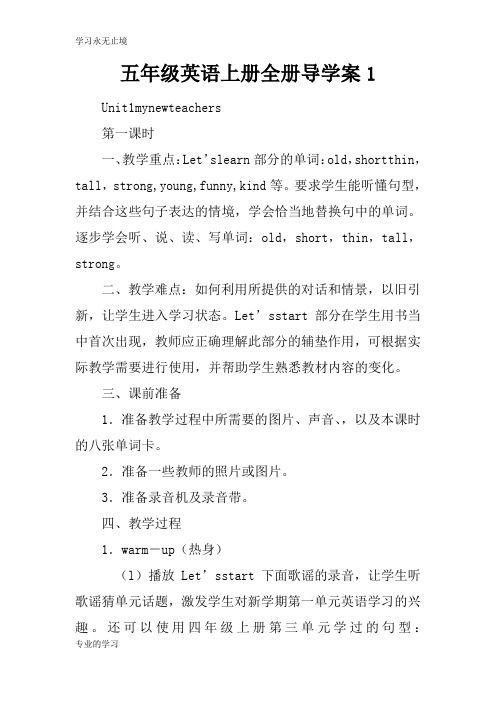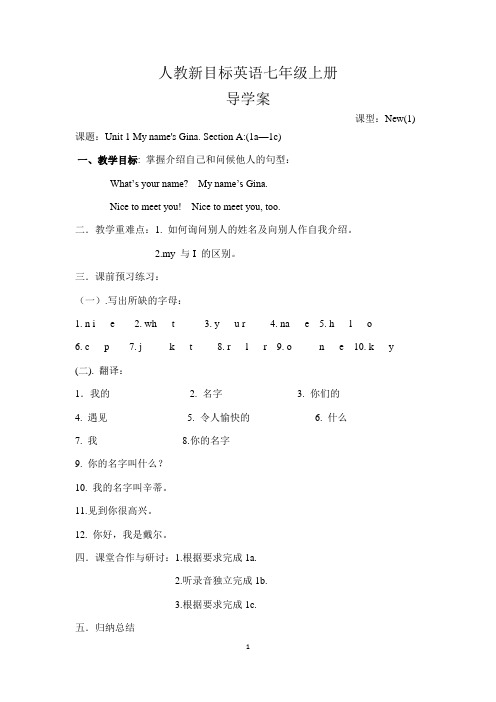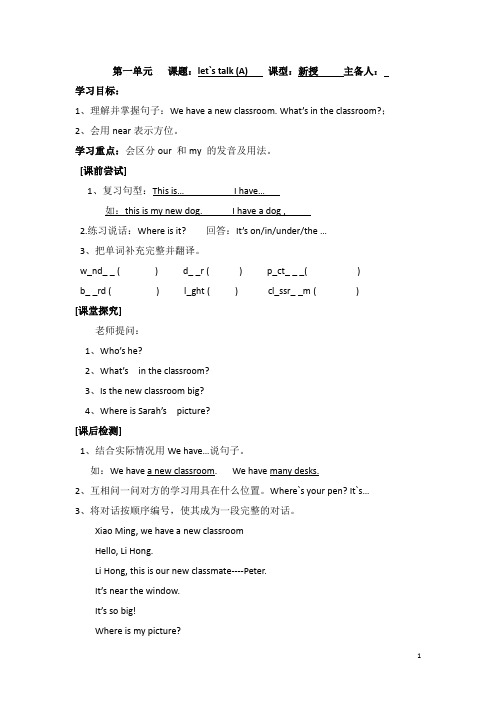Unit1 导学案
人教版八年级英语下册《Unit 1 What’s the matter》导学案1

本文由一线教师精心整理/word 可编辑1 / 1《Unit 1 What ’s the matter 》导学案1课题 Unit 1 What ’s the matter? Section A导学目标: 1. 疾病与事故伤害的询问与应答:What ’s the matter with …? I have a cold. 2. 情态动词 should 询问及陈述建议 3. 健康与急救常识 4.关爱他人重点:健康问题及提出相关建议的语言结构 难点:词汇量多导学过程 导学过程1. 询问某人患了何种疾病或遇到什么麻烦“怎么了?” What ’s the matter? What ’s the matter with you? 还可以有如下替换:What ’s your trouble? What ’s the trouble with you? What ’s your problem? What ’s the problem with you? What ’s up? What ’s wrong with you?2. 疾病,伤害及救治的表达(1)用 “have/get a(n) +疾病名称” 表示患病:have a cold, have a fever, have a cough, get astomachache, get a toothache, catch a cold(2)用 “be/feel + 形容词”表示不适:be/feel tired, be/feel sick, head feels hot(3)用“get ”表示受伤: get hurt , get cut in the hand, get hit by a ball(4)用“hurt /cut/break+具体部位”表示伤害:hurt my leg, cut her finger, break his arm(5)用“hurt /cut 等+反身代词”表示伤着自己:hurt myself , cut himself(6)用“take (更常见 )/get ”表达诊治:take one ’s temperature, take some medicine, take/get anX-ray(picture)(7)用see 或 go to 表达就医:go to the hospital看医生 go to a doctor go to see a doctor go to the doctor ’s see the doctor 看牙医 go to a dentist go to see a dentist go to the dentist ’s see the dentist3. should (should n’t)(1). 委婉地提出意见或建议时,“应该,应当”You should eat lots of healthy food. (你应该多吃些健康的食品) Should I help you clean the park? (我应该帮你打扫公园吗?) What should I do for them? (我应该为他们做些什么?) (2). 表示义务责任,“应该,应当”You should pay for the books. (你应当付书钱) (3). 命令或要求,语气比较强烈。
五年级英语上册全册导学习型教学案1

五年级英语上册全册导学案1 Unit1mynewteachers第一课时一、教学重点:Let’slearn部分的单词:old,shortthin,tall,strong,young,funny,kind等。
要求学生能听懂句型,并结合这些句子表达的情境,学会恰当地替换句中的单词。
逐步学会听、说、读、写单词:old,short,thin,tall,strong。
二、教学难点:如何利用所提供的对话和情景,以旧引新,让学生进入学习状态。
Let’sstart部分在学生用书当中首次出现,教师应正确理解此部分的辅垫作用,可根据实际教学需要进行使用,并帮助学生熟悉教材内容的变化。
三、课前准备1.准备教学过程中所需要的图片、声音、,以及本课时的八张单词卡。
2.准备一些教师的照片或图片。
3.准备录音机及录音带。
四、教学过程1.warm-up(热身)(l)播放Let’sstart下面歌谣的录音,让学生听歌谣猜单元话题,激发学生对新学期第一单元英语学习的兴趣。
还可以使用四年级上册第三单元学过的句型:“Ihaveanewfriend.He’stall.He’sstrong,too.”并结合相关人物的图片,引导学生复习strong,tall,short,thin等词,为本课时听、说、读、写这些单词做好准备。
(2)日常口语练习,内容可参考如下:T:Hello,everyone!welcomebacktoschool!Nicetoseeyou!Ss:Nicetomeetyou!问学生几个问题,引出本课重点内容。
具体会话可参考如下:T:Hi,everyone!Nicetoseeyouagain.whatgradeareyouinnow?Ss:we’reinGrade5.T:DoyoulikeyournewEnglishbooks?Ss:yes!T:whatarewegoingtotalkaboutinUnit1?Guess!what’sthetopicofUnit1?2.Presentation(新课呈现)(l)出示Let’sstart部分图片,介绍说:Rabbithasmanynewteachersinherschool.Doyouhavenewtea chers?引导学生根据情景图的提示描述新教师。
七年级上英语Unit1 导学案

Unit l My name’s Gina.Period One (SectionA 1a-1c)姓名班级学号【学习目标】一、知识目标:1.熟练掌握单词my, name, meet, you等。
熟读英文名字Gina, Alan, Jenny, Brown.2.学会运用Hello, Hi. Nice to meet you?等招呼用语。
3.能正确听辨运用What's your name?来询问他人的姓名4.熟练运用My name's.../ I'm....来进行自我介绍。
二、能力目标:正确运用What's your name?来询问他人姓名和运用My name's... / I'm...来介绍自己。
三、情感目标:广交好友。
四、学习重难点:1.使用形容词性物主代词my, your.2. 大量的英语人名。
【快乐自学】领悟基础知识我能行一、试一试,看英标学1a-1c的新单词(Page95的P1)。
请同学们先记忆然后完成下题 1. 我的名字 2.地图 3.你的名字4.见到你很高兴。
meet you.5.你叫什么名字?your name?6.我的名字叫Mary. Mary.或者Mary(选做)二、请大家先看看书本P1中1a的图片,然后写出你所知道的英语单词。
(看谁写的最准确最多哦)。
【自学小结】【群学学案】Step1.自学点评Step2.小组讨论1a图中的物品用英语如何表达。
Step3. 听力训练1、听录音,完成1b. 2、听录音朗读听力材料,模仿口语。
Step4. 模仿听力材料操练对话,小组內编写自己的对话,并进行操练。
Step5. 组内作品在班内展示,比一比看谁表现最好。
Step6.合作探究:1)你叫什么名字?用英语表达为?请大家思考一下:我的名字叫Alan.怎么回答?(答案不止一个哦。
)2)Nice to meet you.的答语是,除此之外的问候语还有3)总结be动词用法:【当堂训练】一、用am, is, are将下列句子填补完整。
人教新目标英语七年级上册unit1全单元导学案(无答案)

人教新目标英语七年级上册导学案课型:New(1) 课题:Unit 1 My name's Gina. Section A:(1a—1c)一、教学目标: 掌握介绍自己和问候他人的句型:What’s your name?My name’s Gina.Nice to meet you! Nice to meet you, too.二.教学重难点:1. 如何询问别人的姓名及向别人作自我介绍。
2.my 与I 的区别。
三.课前预习练习:(一).写出所缺的字母:1. n i __ e2. wh __ t3. y __ u r4. na __ e5. h __ l __ o6. c __ p7. j __ __ k __ t8. r __ l __ r9. o __ __ n __ e 10. k __ y(二). 翻译:1.我的_________ 2. 名字_________ 3. 你们的___________ 4. 遇见_________ 5. 令人愉快的__________ 6. 什么__________ 7. 我___________ 8.你的名字_______________9. 你的名字叫什么?_________________________10. 我的名字叫辛蒂。
_________________________11.见到你很高兴。
___________________________12. 你好,我是戴尔。
_________________________四.课堂合作与研讨:1.根据要求完成1a.2.听录音独立完成1b.3.根据要求完成1c.五.归纳总结1.my 与I 的区别:my 意为“我的”,是形容词性的物主代词,在句子中充当定语,修饰名词;I意为“我”,是主格代词,在句中充当主语,其后面的be动词用am.如:I am a boy. My name is Bob. 我是一个男孩,我的名字叫鲍勃。
Unit 1 Will people have robots导学案1

Unit 1 Will people have robots?导学案一、学习目标、重点、难点学习目标: 1.will引导的一般将来时肯定与否定形式对将来发生的事情进行预测。
2.Ther.b.句型的一般将来时.3.mor..les..fewe.的用法.4.学习一般将来时态的相关知识, 学会对未来进行预测.5.通过时间对比复习一般过去时态、一般现在时态, 巩固一般将来时.学习重难点: 1.will构成一般将来时态的句式。
2.Ther.b.句型的一般将来时态。
3.mor..les..fewe.的用法。
4.准确表述将要发生的事情。
二、知识概览图三、新课导引To ask the students some questions, such as, do you want to live on the moon? Can you guess what will happen in ten years? Then collect the students’ answers and say something about their predictions.四、教材精华1.D.yo.thin.ther.wil.b.robot.i.people’.homes.你认为在人们家里将会有机器人吗?(1)本句是一个含有宾语从句的复合句, 省略了that, there will be robots in people’s homes 作think的宾语, 为宾语从句。
Do you think the boy will buy a few new computer games?你认为这个男孩会买一些新电脑游戏吗?(2)从句there will be robots in people’s homes为there be 句型的一般将来时, 其结构为“There + will be +主语+其他”, 表示“将会有……”。
There won’t be any pollution some day.将来有一天会没有污染。
【人教版PEP小学四年级英语上册教案】Unit 1 导学案 3

第一单元课题:let`s talk (A) 课型:新授主备人:学习目标:1、理解并掌握句子:We have a new classroom. What’s in the classroom?;2、会用near表示方位。
学习重点:会区分our 和my 的发音及用法。
[课前尝试]1、复习句型:This is… I have…如:this is my new dog. I have a dog ,2.练习说话:Where is it? 回答:It’s on/in/under/the …3、把单词补充完整并翻译。
w_nd_ _ ( ) d_ _r ( ) p_ct_ _ _( )b_ _rd ( ) l_ght ( ) cl_ssr_ _m ( )[课堂探究]老师提问:1、Who’s he?2、What’s in the classroom?3、Is the new classroom big?4、Where is Sarah’s picture?[课后检测]1、结合实际情况用We have…说句子。
如:We have a new classroom. We have many desks.2、互相问一问对方的学习用具在什么位置。
Where`s your pen? It`s…3、将对话按顺序编号,使其成为一段完整的对话。
Xiao Ming, we have a new classroomHello, Li Hong.Li Hong, this is our new classmate----Peter.It’s near the window.It’s so big!Where is my picture?Nice to meet you, too.Hello, Xiao Ming.Nice to meet you.Let’s go and see.Ok.Wow![作业设计]一、选择填空。
1. What colour is the ball?( )A.It’s big.B. It’s blue.C. It’s near the window.2. What’s in your classroom?( )A.This is a desk. b.It’s nice.c.A board, two lights, many desks and chairs.3. Where are your pencils? ( )A. I have many bags.B. They are heavy.C. They are in my bag.4. Where is my seat?( )A. It’s in the desk.B. It’s near the window.二、练习句子:We have…第一单元课题:let`s lean A 课型:新授主备人:学习目标:1、理解句子:What’s in the classroom?2、能够听、说、认、读classroom, window, door, picture, blackboard, light等单词。
人教版英语九年级全册Unit1 SectionA(3a-3c)精品导学案
( )2. A. talked B. talk C. sing D. sang
( )3. A. thinkB. believe C. forgetD. understand
( )4. A. either B. neither C. also D. too
足球赛的票_______________________
2.Why did Wei Fen find it difficult to learn English?
find+宾语+adj.+to do sth. .
Wang Dan found it easy to learn English.
写出find的其他用法
II.单项选择
1.-How do you improve your listening?
-I improve it by ________.
A.watch English moviesB.to watch English movies
C.watching English movies D.watches
A. its B. that C.this D.it
III、完形填空
Last year my English class was ____1___for me. First of all, it wasn’t easy for me to understand the teacher when she ___2___to the class. To begin with, she spoke too quickly, and I couldn’t ___3___every word. Later on , I realized it doesn’t matter if you don’t understand every word, ___4___ I was afraid to speak in class because I thought my classmates might laugh ___5__me. I couldn’t always make complete sentences, either. Then I started to ___6___ English-language TV. It helped a lot. I think that doing lots of listening practice is one of the secrets of ___7___a good language learner. Another thing that I found very difficult was English ___8___. So I decided to take lots of grammar notes in every class.
2024年新版人教版七年级上册英语Unit 1(第3课时 Section A)(导学案)
1.What kind of questions are they?__________________________________________________2.Read the sentences and circle the verbs.Then write am,is or are next to the personal pronouns.3.Do you find the rules about the use of be verbs ?________________________________________________________________________4.Practice 将下列主语与be动词搭配5.含有be动词的句子怎么变成一般疑问句?I am a student.________________________________________________________________6.Practice 将下列句子改为一般疑问句,并做肯定和否定回答。
①She is Linda._____________________________________________________________________________②I am from China._____________________________________________________________________________Introduce one of your new friends to a partner.一、用am,is,are填空1.What kind of questions are they?含有be动词的一般疑问句/ 由特殊疑问词引导的特殊疑问句2.Read the sentences and circle the verbs.Then write am,is or are next to the personal pronouns.3.Do you find the rules about the use of be verbs ?I(我)用am, you(你)用are,is 跟着she (她),he(他),it(它),单数一律用is,复数一律都用are。
人教版七年级英语下册unit1第1课时导学案
专注:心无旁骛,万事可破新人教版七年级英语下册unit1第1课时导学案单元总览类别课程标准要求掌握的项目单元话题Talk about abilities:In this unit, students learn how to talk about what club they want to join and writethe advertisement for jobs.重点单词1.guitar(n.)2.sing(v.)3.swim(v.&n.)4.dance(v.&n.)5.draw(v.)6.chess(n.)7.speak(v.)8.join(v.)9.club(n.)10.tell(v.)11.story(n.)12.write(v.)13.show(n.&v.)14.talk(v.&n.)15.drum(n.)16.piano(n.)17.violin(n.)18.also(adv.)19.people(n.)20.home(n.&adv.)21.make(v.)22.today(adv.)23.center/centre(n.)24.weekend(n.)25.teach(v.)26.mus ician(n.)重点词组1.play chess2.speak English3.be good at…4.talk to…5.play the drums6.play the piano7.pla y the violin8.be good with…9.make friends10.help(.)with sth.11.on the weekend重点句式1.—Can you swim?—Yes,I can./No,I can’t. 2.—Can she speak English? —Yes,she can./No,sh e can’t.3.—What club do you want to join?—I want to join the music club.4.—What can you do? —I can dance.单元语法1.要求掌握情态动词can的用法,包括一般疑问句、特殊疑问句和否定句;2.要求学生会用目标语言Can you…?等仿写招聘广告。
九年级英语导学案(unit1)
九年级(上)导学案Unit 1 The Changing WorldTopic 1 Our country has developed rapidlySection A【学习目标】:1.能记住并掌握take place、bell、Africa、volunteer四个单词的拼写和用法,能理解so…that、improve的用法。
2.初步学习现在完成时态。
3.重点学习have /has been to 和have / has / gone to 的区别及用法。
4.学会描述假期生活。
【学习的重难点】:1.单词和短语:take place、bell、Africa、so…that、improve、volunteer2.重点句型及交际用语:(1)Rita , you have just come back from your hometown..(2)Great changes have taken place there…(3)—Where have you been , Jane ?—I have been to Mount Huang with my parents.(4)She has gone to Cuba to be a volunteer and she will be back tomorrow.(5)There goes the bell.【学习过程与方法】:课前做好预习,标出不会的内容,并试着积极、主动解决问题。
做好相关的记录。
也可以寻求同桌、小组的帮忙,聆听同学的见解。
课中专注于老师的讲解和总结。
课后及时归纳、复习。
【学习内容】:一、自主学习自主学习任务一:记住take place、bell、Africa、so…that、improve、volunteer六个单词和短语的发音和拼写。
自主学习任务二:熟练朗读课文,并能找出课文中含有现在完成时态的句子。
通过观察,归纳出现在完成时态的结构为______________________。
- 1、下载文档前请自行甄别文档内容的完整性,平台不提供额外的编辑、内容补充、找答案等附加服务。
- 2、"仅部分预览"的文档,不可在线预览部分如存在完整性等问题,可反馈申请退款(可完整预览的文档不适用该条件!)。
- 3、如文档侵犯您的权益,请联系客服反馈,我们会尽快为您处理(人工客服工作时间:9:00-18:30)。
Unit1导学案主备:兰云琴Section A 1a-2c ( 1课时)【学习目标】学会用将来时态预言。
【重点、难点】1.will 构成的一般将来时态的陈述句、否定句、疑问句及回答。
2. There be 句型的一般将来时。
自主互助学习知识剖析:一般将来时态构成: will / be going to +动词原形1.用be going to do表示将来:,一是表示“意图”,即打算在最近的将来或将来进行某事。
Are you going to post that letter? I am going to book a ticket.另一意义是表示“预见”,即现在已有迹象表明将要发生或即将发生某种情况。
It’s going to rain.2.用will/ shall do表示将来:You will feel better after taking this medicine. 助动词will+动词原形I will not lend the book to you. 变否定句直接在will后加notShe will come to have class tomorrow.Will she come to have class tomorrow? 变一般疑问句,直接把will提到句首。
Yes,she will/ No.she won’t .3. fewer 与less及more表数量的用法。
1)few(形容词)“几乎没有,很少的”,修饰可数名词。
其比较级、最高级为规则变化:few-fewer-fewest“a few”表示“一些”“few”带否定含义,“几乎没有”。
2)little(形容词)“很少的,几乎没有的”(“小的,幼小的”),修饰不可数名词。
其比较级、最高级为不规则变化:little-less-least。
例:There will be less pollution.“a little”表“一些”,“little”带否定含义,“几乎没有”。
3)many“许多”,修饰可数名词。
much“许多”,修饰不可数名词。
比较级、最高级为不规则变化:many / much -more-most。
重点难点释义:1. In ten years 十年后In+一段时间:…..之后in 5 months :5个月后in 3 years: 3年后in a week: 一周后I′ll be a reporter in ten years.十年后我会是一个记者【课堂练习】一、根据汉语意思,完成句子。
1. 书籍将会仅仅在电脑,而不在纸上。
Books _____ only _____ on computers, not _____ paper.2. 今后在这座城市将会有更多的树木,更少的污染。
__________ trees and _____ pollution in the city in future.3.你认为人们家里将会有机器人吗?Do you will be in people’s homes?4. 他们不会去野营。
我确信他们将来参加我们的聚会。
They _____ go . They _____ come to our party, I’m sure.5.100年后孩子们还要去上学吗?---不,他们将不用上学.------ kids go to school 100 years------ No, they【拓展练习】一、单项选择()1.I ________ rockets to the moon when I grow up.A. will putB. will flyC. will take()2.If there are ________ trees, the air in our city will be ________ cleaner.A. less; moreB. more; moreC. more; much()3.I predict he will be an engineer ________ ten years because he is so interested in making things.A. inB. afterC. later()4.There were many famous predictions that never ________ .A. come trueB. came realC. came true()5.“The work of Picasso will never be ________ anything, ”someone said.A. costB. worthC. spendsection A 3a-4 (1课时)【学习目标】1.理解并会用句型what do you think …will be in 10 years?预测未来。
2.会用过去.现在.将来三个时态谈论自己的经历与打算。
【重点、难点】用will句型预测未来。
【导学指导】温故知新一、翻译短语。
1)将会有…2)更少的人3)10年以后4)更多的使用地铁5)更多的污染6)免费的7)谈论8)更少的汽车二、写出下列动词的过去式。
live play study work finishtry be have buy teachget take eat fall drive 自主互助学习课前预习小组合作,在课本上找出下列短语和句子并在课文上标记出来。
1)在高中2)在大学3)5年前4)5年后5)更多的高楼6)打网球7) 你认为5 年后Sally 会什么样?8) 我认为有更多的高楼。
9) 我认为没有更多的高楼。
10) 将会有更少的小车、更多的公共汽车吗?2.做Pair work: 3b 练习目标语言,完成下列句型:1)那儿将有更少的污染2)每家都会有一个机器人3)你认为人们100年后还用钱吗?4)孩子们将在家里通过电脑学习【课堂练习】一、用括号内所给词的适当形式填空。
1. They _________ ( not have ) any classes next week.2 . Betty _________ ( write ) to her parents tomorrow.3. Look at those clouds. It _________ (rain ).4. He _________ ( read ) an English book now.5. Look! Many girls _________ (dance) over there.6. She _________(not visit) her aunt last weekend.She ________ (stay) at home and _________(do) some cleaning.7. I am afraid there ___________(be)a meeting this afternoon. I can’t join you.8. Tomorrow __________ ________ (be) a sunny day again.9. What are you __________ (go) to do this afternoon?10. We_______ (be) _________ ________(go) have a meeting tomorrow.【拓展练习】一、单项选择。
( )1. —Will people live to be 300 years old? —_________.A. No, they aren'tB. No, they won'tC. No, they don'tD. No, they can't( )2. There will be _________ pollution this year than last year.A. fewerB. muchC. lessD. many( )3. I think people here are friendly. Do you agree _________ me?A. withB. toC. onD. from( )4. —Where is Miss Wang?—She went to Hainan Island last week and will return ________ six days.A. agoB. laterC. behindD. in( )5. —_________ will they play? —They will play football.A. What subjectB. What sportC. What foodD. What language( )6. I will see you again _________.A. a dayB. every dayC. one dayD. everyday( )7. Toby often talks ___but does ___.So everybody says he is a good boy.A. little, manyB. less, moreC. more, lessD. many ,little。
